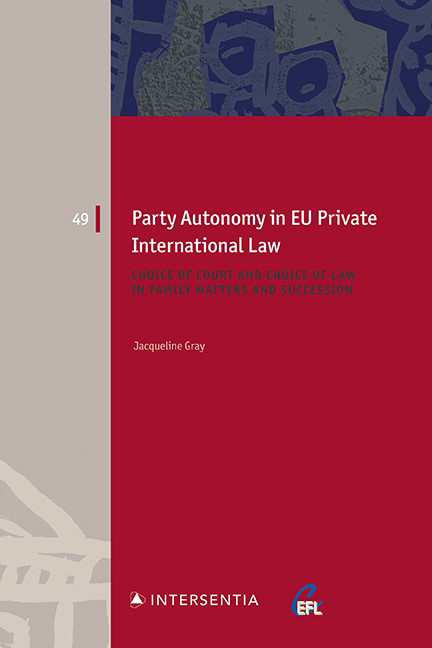 Party Autonomy in EU Private International Law
Party Autonomy in EU Private International Law Published online by Cambridge University Press: 25 May 2021
INTRODUCTION
In embarking upon this examination of party autonomy within the EU private international law framework relating to family matters and succession, the next two chapters of this book are dedicated to establishing the factors through which this analysis will be guided. This chapter will focus upon the role of free will in the context of party autonomy, with the eventual goal of presenting the preliminary values attached to this concept within the present realm.
The chapter is divided into three stages. Firstly, the intrinsic value attached to the exercise of free will shall be analysed, with particular attention paid to the weight that can be attributed to it in private international law (2.2.). Secondly, this investigation will be brought into the present EU setting, in which the values attached to free will within the European human rights framework and CJEU case law will be presented (2.3.). Finally, the examination will narrow in upon the particular context around which this book revolves – the EU private international law relating to family matters and succession – through establishing the preliminary significance of free will in this setting and the caveats that exist in this regard (2.4.).
THE INTRINSIC VALUE OF FREE WILL IN THE PARTY AUTONOMY CONTEXT
The first step in this exploration of the value of free will in the exercise of party autonomy in this present EU private international law realm involves stepping back to examine its essential components and its placement within the legal framework. This will necessitate establishing the requisite elements that compose the exercise of free will in this setting (2.2.1.), presenting the purported rationale for attaching intrinsic value to the exercise of free will in this context (2.2.2.), and considering the hierarchy between will of the parties and the law (2.2.3.).
REQUISITE ELEMENTS OF FREE WILL
Autonomy takes its roots from the Ancient Greek word autonomia – literally meaning self (auto-) law (nomos) – the exercise of self-determination or selfgovernance – the freedom to choose one‘s own path. It applies on a variety of diff erent levels (from the governmental to the individual) and in a multitude of diff erent spheres (e.g. medical ethics, religion, education, contract law and, of course, for these present purposes, private international law).
To save this book to your Kindle, first ensure [email protected] is added to your Approved Personal Document E-mail List under your Personal Document Settings on the Manage Your Content and Devices page of your Amazon account. Then enter the ‘name’ part of your Kindle email address below. Find out more about saving to your Kindle.
Note you can select to save to either the @free.kindle.com or @kindle.com variations. ‘@free.kindle.com’ emails are free but can only be saved to your device when it is connected to wi-fi. ‘@kindle.com’ emails can be delivered even when you are not connected to wi-fi, but note that service fees apply.
Find out more about the Kindle Personal Document Service.
To save content items to your account, please confirm that you agree to abide by our usage policies. If this is the first time you use this feature, you will be asked to authorise Cambridge Core to connect with your account. Find out more about saving content to Dropbox.
To save content items to your account, please confirm that you agree to abide by our usage policies. If this is the first time you use this feature, you will be asked to authorise Cambridge Core to connect with your account. Find out more about saving content to Google Drive.